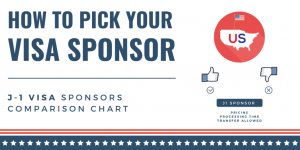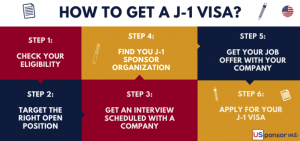What is J-1 Visa?
The J-1 visa for the USA is a non-immigrant visa. The J-1 program was started to bring scholars into the United States temporarily for a specific educational purpose (teaching or conducting research). Today, it also focuses on promoting cultural exchange with an exchange of skills between Americans and the rest of the world.
Statistically, the J-1 visa was the most common type of visa for French people. In 2014, around 15,000 have been delivered.
Who is it for?
There are 15 J-1 exchange visitor programs, all completely different from one another. Here are the different programs and their specific eligibility criteria:
- Short-Term Scholar: This maximum 6-month visa is intended for teachers, researchers, and post-doc, pre-doc, and graduate students participating in a lecture, training, or observation in the US.
- Professor & Research Scholar: Intended for a duration of 3 weeks to 5 years, this program includes teachers or researchers participating in a research or teaching project in the U.S.
- Alien Physician: With a limit of 7 years, this visa is for graduated medical students to continue their education in the United States.
- Intern: With a maximum duration of 12 months, this program is for students enrolled in an academic university or college outside of the U.S., or students who have graduated within 12 months from the program start and want to participate in an internship program in their field of study.
- Trainee: This visa is perfect for someone with a post-secondary degree or certificate from outside of the U.S. (plus one year of work experience), or 5 years of work experience in total. It will allow you to participate in a structured program in your professional field for a duration of 18 months max – Am I eligible for a J1 Trainee?
- Specialist: A visa for recognized experts participating in an observation or consultation program.
- Secondary School Student: This visa (for a maximum of 2 semesters) is for secondary school students between the ages of 15 and 18.5 years old participating in an accredited public or private secondary school.
- College and University Student: This is for a college/university degree or non-degree applicant from outside the U.S. enrolled in a degree or non-degree program at an accredited post-secondary academic institution, or for a student in a student internship program
- Summer Work Travel: For university students working in unskilled seasonal or temporary jobs, this visa is perfect.
- Camp Counselor: This is intended for youth workers, students, teachers, or individuals with specialized skills and experience serving as counselors in a U.S. summer camp.
- Au Pair: This visa is for 18 to 26-year-olds with a secondary school level education. It provides child care to host families while the applicant takes courses at a U.S. post-secondary accredited academic institution.
- Teacher: This visa will allow an educator to stay in the United States for up to 3 years to teach full-time in an accredited primary public or private school.
The J1 visa has many advantages for a company. It is fast and easy to obtain compared to other non-immigrant work visas. However, it also has some restrictions.
How Does the J-1 Visa Work?
In order to work in the US, you will need a visa regardless of your situation. In the case of a J-1 visa, it is not your company that will have to sponsor you, but rather a J-1 sponsor organization. So, keep in mind that you cannot complete your visa application without a J-1 sponsor organization.
So, the four mandatory agents that you need for getting a J-1 visa are:
- Yourself (logical, I know);
- The company that wants to hire you;
- Your J1 Sponsor (or J1 sponsor organization);
- The US Government (specifically, the Department of State and your consulate).
You will find all the sponsor organizations for the J-1 visa here. You can contact them to get a sponsorship agreement before even having a job offer (and I strongly recommend you do so). You just need to have an agreement from one sponsor organization.
However, these organizations will not be able to actually sponsor you for the J-1 visa until you get an offer. Once you find a company that offers you a trainee program, you can apply for a visa.
There is no quota, and your application can be sent at any time throughout the year.
Do I Need a Lawyer?
Your case to apply for a J-1 visa can be one of two things: simple or complicated. Let me clarify what I mean by that: a simple visa case is a case where someone has never been to the US before (as a tourist or student). If that situation describes you, you won’t need a lawyer and can handle your visa application on your own. Well, technically not on your own because you will receive help from your sponsor or another organization. They can assist you in submitting your application through your sponsor and embassy.
If you already have worked in the United States or participated in an exchange program, your situation will be a bit more complicated. My advice is to get help from an immigration lawyer to make sure you are eligible and to help you prepare a solid application.
J-1 Visa Application
As it is not up to your host company to sponsor your visa, the administrative procedures on the business side are greatly simplified. You may be able to bypass hiring a lawyer if you have a very straightforward case.
And, as an applicant, you will have the possibility to take care of all the administrative procedures for your J1 visa application with your sponsor organization, without taking the precious time of your future employer. You can also be helped by an organization to submit your visa application.
Your employer will have to validate all documents, including the training program that you will submit.
The application process differs for each type of program and requires a thorough knowledge of each one’s requirements. Indeed, if you don’t complete the proper paperwork, the foreign national’s application may be denied.
J-1 Visa Processing Time
The processing time to obtain a J-1 Trainee visa is usually between 3 and 12 weeks, depending on the sponsor organization you will choose, whether you pay for speedy processing and the consulate’s availability for an interview.
Can the J-1 Visa Bring Family?
You will have the opportunity to be accompanied by your spouse and/or children. Cohabitation, or civil union, is not recognized in the United States; therefore, you need to be legally married. Your spouse and/or children will also receive a visa, a J-2 (J2), which will allow them to live with you, and your spouse will also be able to work in the U.S.A. However, you will have to prove that his or her salary is supplementary and that you do not need it to live in the U.S.
Change of Employer During Your J1 Program
Your J-1 visa is related to your company/organization. In other words, if your program falls through, you will need to transfer your visa to another company if you want to continue living in the U.S., and that’s if your sponsor organization allows you to do so.
J-1 Cost
The price to obtain a J-1 depends on the J-1 category and the length of the program.
For example, for the maximum amount of time, the J1 Trainee visa will cost between $2,000 and $3,500. Check here the J1 cost details.
Who Will Pay Your J-1 Visa Fees?
A visa is never free.
Three parties can pay the costs of the J-1 visa; you, your employer, or a government agency (if you enroll in a special program). I’m not sure if those government agencies are the same ones that sponsor your visa (that is yet to be confirmed).
To avoid the 212 rule (which forces you to return home for at least two years after your exchange visitor program), you or your employer should cover the visa fees, and not a government agency. So, if you do not want that the J-1 visa 212 rule applies to you, be very careful regarding this detail.
Depending on your financial means, you should negotiate with your employer to support these additional costs.
It is, therefore, important to take into account the price of your visa in your expatriation budget if you do not want to possibly come up short. As the demand is usually stronger than the offer, you are likely to have to pay for your visa fee.
Compensation and Health Coverage
There is simply no restriction, minimum or maximum, on income for this visa. You may not be paid at all, you might not be paid as much as other employees in the company, or you might be paid more. But always keep in mind that the J-1 Trainee visa allows you to acquire new skills and improve your expertise. In our example, Max was paid the same salary of the other employees working in the same sector as him in his company.
In terms of health coverage, you will be covered by the health insurance of your sponsor, which is included in the fees. This is a huge advantage since medical costs in the United States are very expensive.
It’s going to save you between $500 (if you are single) to $1,800 (if you have a family) per month for you and your employer.
Tax Benefits
In addition to having no legal fees at the beginning of the process and no monthly healthcare coverage fees, your employer and yourself experience tax benefits with a J-1 visa. This visa is actually exempt from:
- Social Security tax
- Medicare tax
- Federal and State Unemployment taxes, since it is an exchange program visa and not a visa to immigrate to the United States (so, you will never be technically unemployed in the USA).
This will save your company about 7.79% and save you 7.11% on your own taxes. Here is a tab resuming J-1 tax benefits:

J-1 Visa Duration
Depending on the training program, the sector, the agreement between you and your company, and the sponsor organization, the duration of the visa can vary from 3 weeks to 3 years.
Check the visa duration of the program you are interested in:
2 Years Home Country Physical Presence Requirement
As you will see later in this article, not all J-1 visa holders are subject to a “2 Years Home Country Physical Presence Requirement“, but some are.
This rule states that you must return to your home country for a minimum of two cumulative years after your J-1 exchange visitor program. In other words, during these two years, you will not be able to obtain H, L, or K visas, permanent resident status, or an immigrant visa.
How Do I Know if I’m Eligible for This 2-Year Rule?
If you are already in the United States on a J-1 visa, you will simply have to check on your visa. If you see the inscription, “Bearer is not subject to section 212 (e) 2-year rule does not apply”, that means that you are not subject to this rule.
In Which Case Does the Rule Apply?
If you are not yet on a J-1 visa, you will be subject to this rule if:
- your exchange visitor program is funded by a government agency
- your country and your field of activity are on the list concerned by this rule

If your program is funded by a government agency, you will be subject to the 2-year rule.
If your country is not listed here, and you do not have your program funded by a government agency, you will not be subject to the 2-year rule.
If your country is listed, check here to see if your field is listed depending on your country. If your field is listed, then you will be subject to this rule. If this is not the case, and you also do not get your program funded by a government agency, you will not be subject to this rule.
For more information, you will find instructions for this here.
The 2-Year Rule Waiver
If you are eligible for the “2-year rule,” there is a possibility to waive it. However, this is only possible if you meet very specific criteria. You will find more information here.
Interested in the J-1 visa? Or have you ever benefited from this visa? Share your experience in the comments below! 🙂
Please see the articles below for more information.
- What is the J1 Trainee visa, and what are the requirements to get it?Important notice before reading this post: nothing in this article is intended to be legal advice, and all information is for educational purposes only. This article has been reviewed by a certified immigration lawyer. As a reminder, you must adapt your job search strategy according to the visa that suits you. Of the 15 J-1 visa exchange programs,… Read more: What is the J1 Trainee visa, and what are the requirements to get it?
- How Much Does a J-1 Visa Cost?As you may already know, the J-1 visa is one of the cheapest to obtain; however, there are still a certain number of fees that you are required to pay. It’s very important that you know about them from the beginning so you can make informed choices regarding choosing your hosting company, and avoid ending… Read more: How Much Does a J-1 Visa Cost?
- A Comparison of J-1 Visa Sponsors: Choose the Best One!What is a J-1 Visa Sponsor? The J-1 sponsors are private organizations certified by the US Department of State that verify J-1 applications and issue SEVIS numbers and DS2019. Your J-1 sponsor is not your U.S. employer. It also may not be the agency with the one you will work with for applying for your… Read more: A Comparison of J-1 Visa Sponsors: Choose the Best One!
- How To Get A J-1 Visa Without Driving Yourself CrazyAs a non-US citizen, you will need a visa to enter and live in the United State of America. The J-1 exchange visitor visa is one of the most popular visas for a temporary stay. But, if you are eligible for and interested in one of these programs, there are a few steps you need… Read more: How To Get A J-1 Visa Without Driving Yourself Crazy
- The J1 Visa Application In 4 Easy StepsBefore we dive into the J-1 visa application process, you must first have a job offer from a company, know what J-1 program is right for you, have chosen a sponsor organization, and reside outside the United States. Step 1: Get Approved By Your Sponsor You already pre-selected your sponsor the moment you attracted a… Read more: The J1 Visa Application In 4 Easy Steps






The information on page has been really helpful. Thank you.